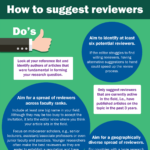In short, 3 months. From reviewing academic forums (see here, here, and here), the general consensus among researchers appears to be 3 months (but see here and here). It is not clear where this figure came from. It may be related to the typical wait times researchers have become accustomed to. An analysis of ~3 […]
My paper was rejected. What are my options?
Almost every scholar has had a paper rejected. Journal acceptance rates are typically low, ranging from 5% for higher impact journals (e.g., The Lancet) to 69% for “pay-to-publish” open access journals (e.g., PLoS ONE), whose criteria exclude the perceived importance of the paper. However, most rejected papers ultimately go on to be published [see 1 […]
Your title and abstract are key to attracting the right reviewers
Potential referees are typically only given the title and abstract when sent an invitation to peer review an article. It is only upon acceptance of the invitation that they will be given the full paper and supporting materials. It follows, therefore, that your title and abstract are essential to attracting and securing the right reviewers. […]
A reviewer asks for additional experiments – what are your options?
Requests for additional experiments typically fall into one of three categories: The suggested experiments are fundamental to proving your argument. You cannot accept/reject your null hypothesis without these experiments. You have provided sufficient proof for your argument; however, additional experiments would add weight to your conclusions. You have provided ample proof for your argument; the […]
How to suggest reviewers
Journals often struggle to find willing reviewers, which can lengthen the publication process. To combat this, you may be requested to suggest reviewers at the submission stage. In the following infographic, we provide some tips on identifying suitable reviewers. The infographic contains the following text: Do’s Aim to identify at least six potential reviewers. […]





